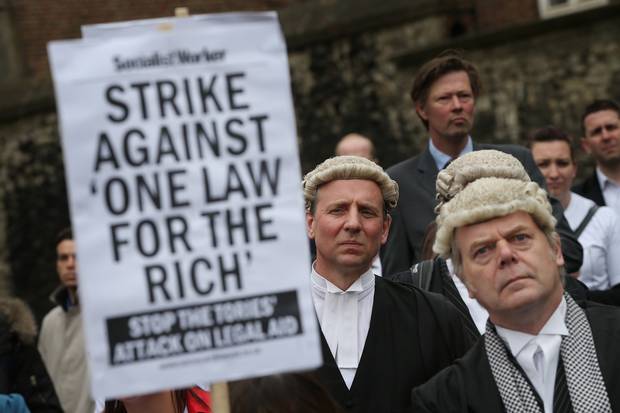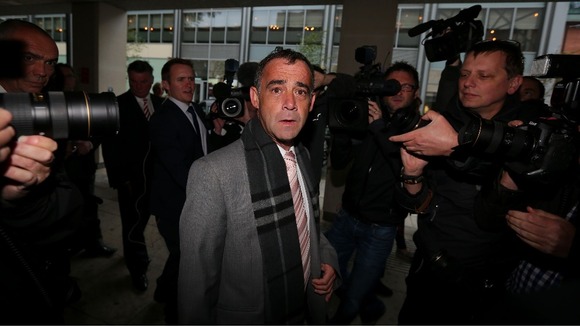
As a token of our appreciation, on behalf of the Law Review I presented Mr. Campbell with a copy of our first volume, printed June 2013
– Mary Wong (LLB Law Newcastle University)
On Friday October 25th, the Canadian High Commissioner to the United Kingdom, His Excellency Mr. Gordon Campbell was scheduled for an afternoon meet & greet session with Canadian students at Newcastle University. Prior to this event, I met with Mr. Campbell for an interview. As a Canadian, it was an absolute pleasure and honour to have a one-on-one chat with a prominent Canadian figure who hails from the beautiful west coast city of Vancouver -which is special to me as my twin sister currently resides there. Here is what he has to say about his role as High Commissioner, the Canada-EU trade agreement, education, and British culture and recreation.
A. Canadian in the UK
1. I understand you have been based in London since your appointment to the role of High Commissioner, how do you like living in England? Do you miss the weather in British Columbia?
Well actually, the interesting thing is when I came to London, everyone said “Oh be careful of the weather in London.” I find it’s very similar to the weather in Vancouver – there’s lots of cloud; there is probably less rain than Vancouver. But no, the weather has not bothered me at all.
Do you miss Canada at all?
I miss my friends and those sorts of things, but you know one of the great things about being here is that I’m not here for the rest of my life. I look at this as an opportunity to absorb the United Kingdom, all of the culture, all of the history. [London] is an incredible international city – you get to meet people from all over the world.
2. What does your day-to-day life look like in your current position?
Most days I’m doing some business-related work, I’m trying to build partnerships, interest investors, and those sorts of things. The High Commission has responsibility for immigration and security and diplomatic services, commercial and economic diplomacy. You have a lot of meetings, you often represent Canada. Today I was representing Canada at Durham University, talking to students there about Canadian opportunities, and [to] Durham officials about possibilities of partnering with Canadian universities.
So we’re focusing on economic opportunity and educational opportunity and educational exchange, which I think is important in the long term. [Example:] the strength of Canada as a financial centre, as a dependable international partner. We’re dealing with lots of issues like Commonwealth reform. We’re in the middle of major activity to consolidate everything around Canada House at Trafalgar Square, and generate new activities for Canadians and Canadian businesses.
3. How have you found the transition from working in provincial politics and now at the international level for Canada?
In lots of ways there are lots of similarities, whether you’re the Premier or the High Commissioner, you are trying to put the best foot forward for your province or your country. I think it’s a great opportunity, I’ve been the mayor of Vancouver and Premier of British Columbia, this is an opportunity to do something for Canada, for the whole country, from Newfoundland to British Columbia, from Saskatchewan to New Brunswick. So that part is a real opportunity for me, personally, and I hope I am doing a good job on behalf of all Canadians. But there [are] big differences between being an ambassador and being a political leader, and they are basically executive differences. Political leaders are responsible for putting in place plans, making sure they get executed and bringing them forward. I can make recommendations, but my political leader, John Baird, the Minister of Foreign Affairs, is the man I work for, I do the things I hope are reflective of his policies and the Prime Ministers’ policies. I try to encourage people to follow along with that.
B. Canada-EU Trade
1. What are your thoughts on the Canada-EU Trade discussions?
I think it would be very good for the EU and Canada. I think there are whole lot of opportunities, certainly for Canada and the United Kingdom, both depend on trade – [it is our] economic life-blood. You think of the vast mineral wealth of Canada, the reason we have vast mineral wealth – and it helps create a quality of life for us – is that it is traded out of the borders.
2. As High Commissioner, how do you think you can contribute to these discussions in the UK on Canada’s behalf?
We will provide you with the information you want. I think when you look at the United Kingdom’s economic strategies and Canada’s, they’re basically the same: we both need trade to improve the quality of life. We both need trade to make sure we have job. Some people say we should not go forward with trade. [For example,] we’ll use my province because that’s the one I am most familiar with: there [are] dozens of mills in British Columbia. The demand we would place on any one of those mills from British Columbia would take care of about one mill. If we didn’t have trade, you probably reduce the [number of] mills in British Columbia by 85% or 90% – that is a whole lot of people who aren’t working – but they are working because of trade. And so, I think you just have to start by understanding how important trade is in Canada, and then you think of the competitive advantage of having a trade agreement with the European Union, and a trade agreement with the United States and Mexico. We will be the only country in the world that has trade agreements with those two predominant markets, and they are dominating markets in world trade. So it’s a great place for Canada to be, and it’s great for our economy, and it’s great for jobs, and it opens doors of opportunities for everybody.
3. What do you think Canadians back home and here in the UK can do to prepare for the impact of this trade agreement?
First thing I think everyone should have is confidence in themselves and what Canada could do. We sometimes look beyond Canada’s strengths. Canada is very strong economically. We’re very strong in terms of our business culture and investment culture. We take a lot of the risks out of investments. I think to know that is to be able to tell the Canadian story. The reason we launched “Canada Plus” here in London, in the United Kingdom, is because we want people to know Canada’s universities and scientists and thought leaders, manufacturers and agriculturalists and energy providers – we have all those things in Canada. So when we think of that and then think of how do we meet the needs of a 500 million person market in the European Union, that’s the largest single market in the world, right? It’s a 17 trillion dollar economy.
What would you say to those Canadians who are concerned about the competition part, like the dairy farmers and auto industry?
I think you always hear concerns about competition whenever you make a change. So in British Columbia there was a lot of change at the end of the Free Trade Agreement from the wine industry, for example. The wine industry today in British Columbia is thriving, and this is why: [because] they are good at what they do. So [we] have to have confidence in ourselves – we’re good at what we do. So Canada had an Olympics in 2010. We said ‘let’s put Canada behind this Olympics,’ and we did. We said ‘let’s put Canada behind our Olympic athletes,’ and we did. And what happened? We had the most successful Winter Olympics in the history of the Winter Olympics. So we beat all of the criteria that would have normally been set if you wanted a competition. We won more gold medals than any country in the history of the Games. Those are things that should remind us of what we could do as Canadians. One of the advantages of going overseas or going somewhere else, is that you realize all the strengths of Canada. When I say that, that does not mean that we do not have things we have to do better – doesn’t mean we have it all perfect – but [it] means we have an awful lot of advantages in competing in the international market place. So the challenge of the market place is to make it a fair playing field, and the way to do that is you reduce all of the barriers that stop it from being fair, which is what the trade agreement does.
Change is always difficult; [but] it will create enormous opportunities in manufacturing, enormous opportunities in the agricultural industry generally.
C. Education
1. What are your thoughts on Canadians coming to the UK to study?
I think everyone who can, should. I think it’s a great opportunity to be here. I think it expands the world of education beyond what happens in the classroom in the university. You come here [and] you are exposed to a different culture, different place, [and] different outlook on the world. The more Canadians who can get outside of Canada and get some of their education there, the better off we are as a country, [and] the better off they are as students.
2. Do you think this choice to study in the UK makes a detrimental remark about the quality of Canadian education?
Absolutely not, and for the same reason I think Canadians should come to the UK, UK students should go to Canada. I think part of the world’s top quality education today is exposure to international opportunities. It is exposure to different cultures, it’s exposure to different languages, it’s exposure to different outlets. When we do that, we learn; and when we learn we can understand; when we can understand, we can solve problems.
3. Each year there is a number of students that come to the UK to pursue the English LLB (Bachelor of Laws) and some hope to return to Canada to practice upon graduation. Many students have cited as their reasons: the difficulty of obtaining a spot in Canadian law schools due to high admission standards and lack of space, and costly LSAT fees. What are your thoughts on this?
It’s hard for me to be opposed to high admission standards, because we’re looking for excellence across the board – professional excellence. I think there are some challenges in terms of creating spaces, but there are a fair number of law schools across Canada that provide opportunities, but there’s probably never quite enough. But I think that people who come here and get legal training here are going to find it’s an excellent education. And then they are going to pass their Bar exams in Canada and all those sorts of things. I think we have to think of more complementary education as opposed to conflicting/ competing education. There are some interesting challenges they face, but they are challenges that can be met, and there’s a lot of difficulties in going into law still, but these are real opportunities, so that’s a positive.
4. Now that you are working in England, do you recommend Canadian students who have studied in the UK to work here for a few years after graduation, before returning home to Canada?
I make no recommendations. I think it’s always up to you as a person, as an individual.
We have a youth exchange programme which allows Canadians to come and be in the United Kingdom for two years, and just to experience things in the United Kingdom, they don’t have a job, it’s a special program – same thing for UK students back in Canada; those are good things I think. So I think in terms of those things, they’re really personal choices. What I think is really important is: you do what is best for you. As long as you pursue your goals and your dreams, you’ll be in great shape.
D. Culture and Recreation
1. Which British dishes have you tried since your arrival in the UK? Do you have any favourites or recommendations?
I’m not really keen on kidney pie, beef or steak – I’m fine. When I hear blood pudding, I don’t say ‘I can hardly wait until I eat it!’ I like haggis, I’m from Scotland. I never figured out the purpose behind mushy peas. But do I have a favourite? I’ll give the British fish and chips, and that’s my favourite.
2. What activities would you recommend Canadians living in or visiting the UK to try while they are here?
There’s no end. The first thing is to know there’s more than one place here. So whether you’re going to Winchester Cathedral or Westminster Abbey, or you’re going up north to Aberdeen, whether you’re golfing in Northern Ireland, or art galleries in Cardiff and London, I recommend that. It’s a rich, rich place for history, for culture. Go to Bonfire Night, go to Remembrance Day service. Go to the pageant they have for the City of London when they turn over the keys. All of those things are rich in culture and costume, and they are pretty exciting to see.
And go to the Canada Day celebrations in London that you will be hosting.
You have to go to the Trafalgar Square Canada Day celebrations -everyone talks about them! It’s a great event and everyone is welcome!
3. Name one new activity or dish, which is typically British, that you would like to try in the near future.
I should probably go to a cricket game. I haven’t done that yet, It’s a perplexing pastime to me, people at work are totally engaged in cricket. I used to play cricket when I was in elementary school.
Have you watched a Manchester United game in Manchester?
I have not watched a Manchester United game in Manchester. I haven’t gone to a football game of any sort of the big rivals. And my colleagues tell me you have to be careful of what you wear, who you cheer for – good sportsmanship is not necessarily something to be admired in the stands.
Thank you for taking the time to speak with me. I look forward to your Meet & Greet at Newcastle University later this afternoon.




